Are you looking to get the most out of your credit cards?
Credit cards can be a great asset when used responsibly and with caution. With the right strategies, you can maximize your benefits from using them while avoiding costly fees and interest charges.
In this blog post, we’ll discuss how to take advantage of rewards programs offered by credit card companies, manage interest and fees associated with making purchases on credit cards, evaluate different types of credit cards for making purchases, set responsible limits on spending with a credit card, find the balance between cash payments and those made with a credit card, use a good credit score when making purchases on a card, save money while using a card wisely and finally leverage the power of financial security through wise usage of your cards.
Understanding How Credit Card Purchases Work
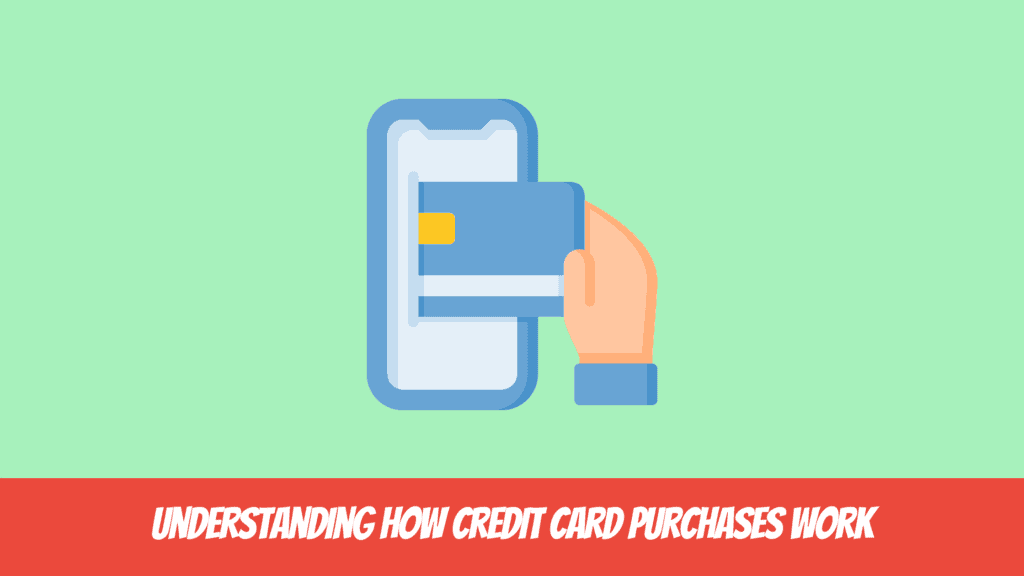
Using a credit card to make purchases is not only convenient but can also help you save money.
For instance, some cards offer cashback rewards or other incentives that can be redeemed for discounts on future purchases.
If you pay off your balance in full each month, you will not have to pay any interest charges and benefit from the extra protection against fraud and purchase coverage offered by most cards.
If you decide to use a credit card, it’s important to be aware of the terms and conditions associated with the card. Make sure you understand the fees, such as annual fees or late payment fees, that might apply, and check for special offers like introductory rates or bonus points.
Familiarize yourself with how payments work: how much do minimum payments cover and what happens if you don’t pay in full each month?
Being informed about this information helps ensure that you use your card responsibly. Also, consider setting up automatic payments so that you never miss a payment date and avoid late penalties.
Maximizing Your Benefits from Credit Card Usage
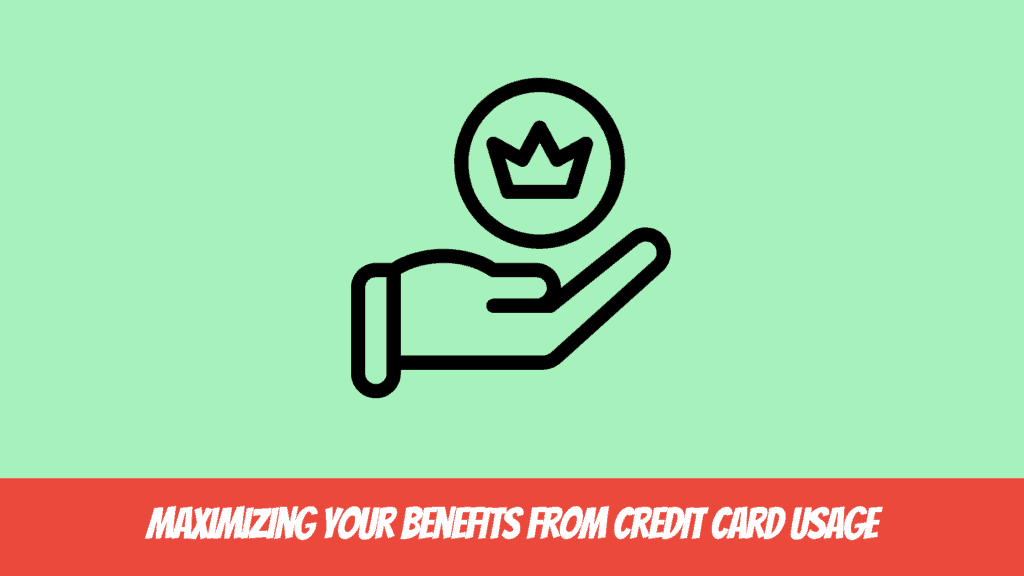
The first step to making the most out of credit cards is to select a card that has rewards programs tailored to your spending habits.
A rewards program will give you points, cash back, discounts, or other incentives that can be applied to future purchases. For example, if you travel often, some credit cards offer airline miles or hotel points when you use their card.
Many cards offer sign-up bonuses that reward customers with a large number of points or cash back after they meet an initial spend threshold within the first few months of having the card.
Besides getting rewards for using your card, it’s important to understand how interest and fees work when using credit cards.
Many credit cards have introductory 0% APR periods for new customers which can allow for financing a purchase at no cost in the short term and free up cash flow from other sources.
After this period expires though, interest rates can become significantly higher so it’s important to factor this into your decision when choosing a card and spending limit for yourself.
Look for a card that offers low foreign transaction fees or no annual fee if there’s potential for international travel or purchases.
It’s also important to be mindful of your spending limits with credit cards as well as find a balance between cash payments and those made with a card.
This means not only limiting yourself on spending but also evaluating whether certain types of purchases are better suited to be made with cash rather than a credit card.
If used responsibly and strategically, however, credit cards can be an incredibly powerful financial tool by allowing you access to added rewards and benefits that may not otherwise be available to you.
Taking Advantage of Rewards Programs Offered by Credit Cards Companies

Rewards programs offered by credit card companies are an excellent way to save money and maximize the benefits of using your card for purchases.
Depending on the specific program, you may be able to earn points or cash-back rewards for every dollar spent.
Points-based programs allow cardholders to accumulate points with each purchase and redeem them for a variety of rewards, such as gift cards, travel miles, or merchandise.
Cashback programs offer a percentage of cash back on certain items. This percentage could range from 1% to 5%, depending on the program.
Before signing up for a rewards program, it is important to research and understand all the different options available.
Look closely at the fees associated with each program because they may offset any savings potential that a rewards program offers.
Staying informed about bonus offers and promotions can also provide additional ways to maximize rewards.
It is also beneficial to review spending habits so that you choose the best reward program that fits your lifestyle and goals. With some careful consideration and research, taking advantage of credit card rewards can be an easy way to earn extra savings while shopping with your card.
Managing Interest and Fees for Making Credit Card Purchases
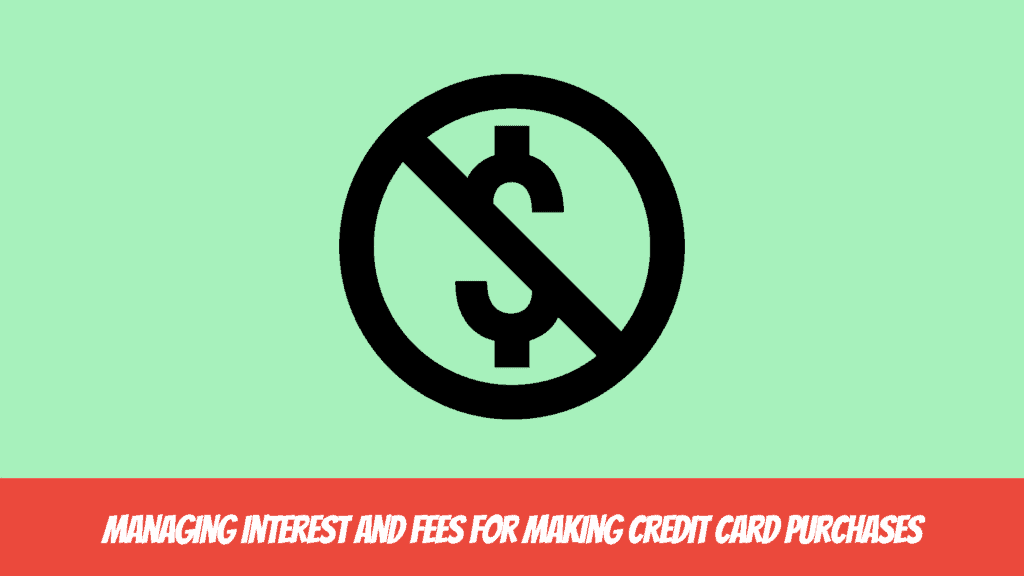
When using a credit card, it is important to be mindful of the interest rates and fees associated with it.
To save on interest when making purchases, look for a card with an introductory rate. This rate may vary depending on the type of card and issuer, so it is important to shop around and compare options before choosing one.
Be sure to read through all of the details regarding fees associated with your card. Common fees include annual fees, late payment charges, balance transfer fees, cash advance fees, and foreign transaction fees.
It is also important to pay attention to when your promotional period ends so you can avoid any potential increase in interest rate once the promotional period has expired.
While some cards offer rewards such as cashback or miles credits for using them regularly, these benefits should not be used as an excuse for carrying a large balance and incurring excessive interest payments.
When possible, aim to keep your balance low or pay off your balance in full each month in order to avoid paying high-interest payments over time.
Evaluating Different Types of Credit Cards for Making Purchases

When evaluating credit cards, the first factor to consider is the interest rate.
Cards with a lower annual percentage rate (APR) will help you save money on your purchases by allowing you to pay off your balance more quickly.
It’s also important to consider rewards programs, which provide cash-back bonuses or other incentives when you make certain types of purchases.
Many cards offer extra points or miles for travel, dining, and grocery shopping.
Look for cards that offer additional bonuses when you reach specific spending thresholds such as reaching a certain number of points within a given time frame.
Annual fees should also be taken into account when selecting the right card for your needs. Some cards charge an annual fee in exchange for higher reward rates or greater flexibility in terms of redemption options.
High-end rewards cards typically have higher annual fees than basic, no-fee cards; however, if you use the card often enough and take full advantage of the benefits offered by these types of cards, they can still be worth it in the long run.
Some credit cards offer special discounts on merchandise or services at select retailers; those discounts may be worth considering if there are stores where you shop frequently.
Tips on Setting Responsible Limits to your Spending with a Credit Card
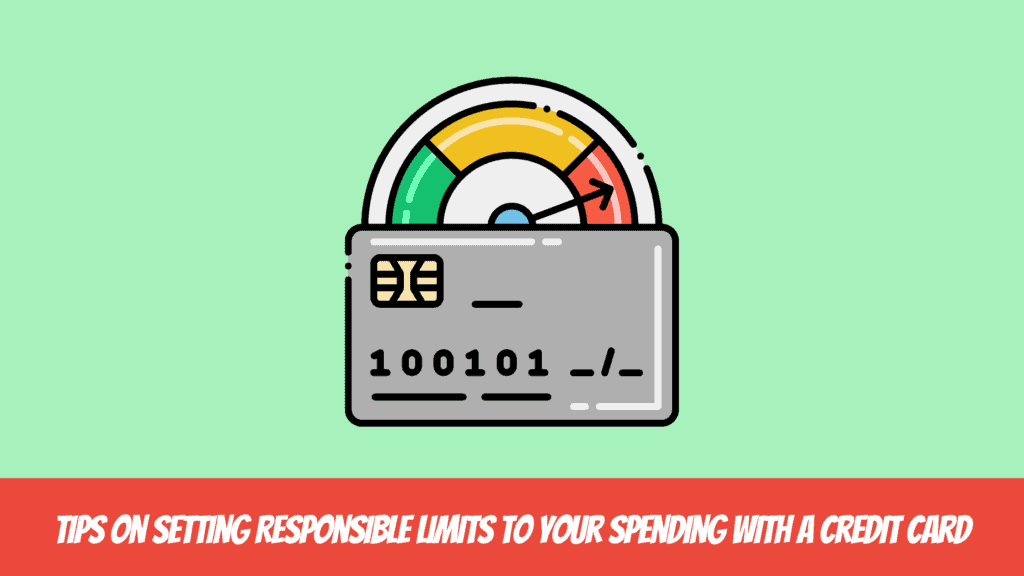
When budgeting with a credit card, it’s important to remember that you should only spend what you can reasonably afford.
To determine how much you can realistically spend with your credit card each month, start by assessing your monthly income and expenditures.
Subtract your expenses from your income and set a limit for yourself that is within 30% of your available credit limit.
For example, if your monthly income is $2000 and after subtracting all of your expenses, you have $1000 left to spend on purchases with a credit card, the most responsible amount to spend would be approximately $300 – or 30% of your available credit limit.
Managing spending responsibly is an important part of using a credit card.
It helps ensure that you stay within budget and pay off any purchases on time in order to avoid late payment fees or going over the limit on your account.
Setting a reasonable limit can also help prevent overspending which could lead to further financial difficulties down the road.
To keep track of spending habits, consider setting up reminders or automatic payments so that bills are always paid on time each month. With proper planning and discipline, it’s possible to use a credit card without incurring any debt or other financial obligations.
Finding the Right Balance between Cash and Credit Card Payments

When using credit cards, it is important to be disciplined and use them responsibly.
To do this, you should find the right balance between cash payments and purchases made with a credit card.
Cash payments are great for everyday items such as groceries, while larger or more expensive purchases can be made with your credit card.
This allows you to take advantage of the convenience that comes with using a card without accumulating too much debt.
When using credit cards, it is essential to make sure that you only spend within your means.
Establishing a budget can help ensure that you don’t overspend and remain within your financial capabilities.
It is also important to pay off any amount that you charge on your credit card each month or as soon as possible so that interest does not build up if you are unable to pay off the entire balance every month.
Over time, responsible use of credit cards can help build good credit scores which can be beneficial when applying for loans and other types of financing in the future.
Steps to Financial Security by Using A Credit Card Wisely

Credit cards can be a great way to help achieve financial security, but they must be used responsibly.
One of the most important steps to using a credit card wisely is to set responsible spending limits.
Before you apply for the card, make sure you understand your overall financial goals and how much credit you can handle.
This will help ensure that you don’t end up in debt or with high-interest payments.
Once you have a credit card, it’s important to stick to your budget and not exceed your self-imposed spending limit.
Monitor your account regularly so that you’re aware of any suspicious activity or potential fraud and adjust your spending if needed.
When possible, pay off balances in full each month so that you avoid accumulating interest charges and having to pay more than necessary for purchases.
Taking advantage of rewards programs such as cash back, discounts on certain items, or free travel can also provide some monetary benefits from using a credit card, so do your research and find out what kind of rewards are available with different cards so that you get the most out of using them.
Strategies to Save Money while Using a Credit Card

One great way to save money while using a credit card is to set up automatic payments from your checking account.
This will ensure that you never miss a payment due date and incur late fees or penalties.
You can also take advantage of rewards programs, such as cashback, where you earn points for every dollar spent.
Look for cards with no annual fees so you don’t have extra costs each year. And if you only need to make small purchases, consider using cash instead of your credit card. This will help you avoid interest charges and keep your balance low.
Another strategy for saving money with credit cards is to pay off your balance in full each month. This way, you won’t accrue interest on the amount you owe and it’s easier to stay within budget.
Consider shopping around for the best rates and rewards programs when selecting a card.
Shop wisely and look for features like purchase protection and fraud protection that can provide extra value and peace of mind when using your card.
Remember to read all the terms and conditions before signing up for any credit card so that you know exactly what kind of fees and charges apply to your account.
Leveraging the Power of a Good Credit Score when Making Purchases With a Credit Card
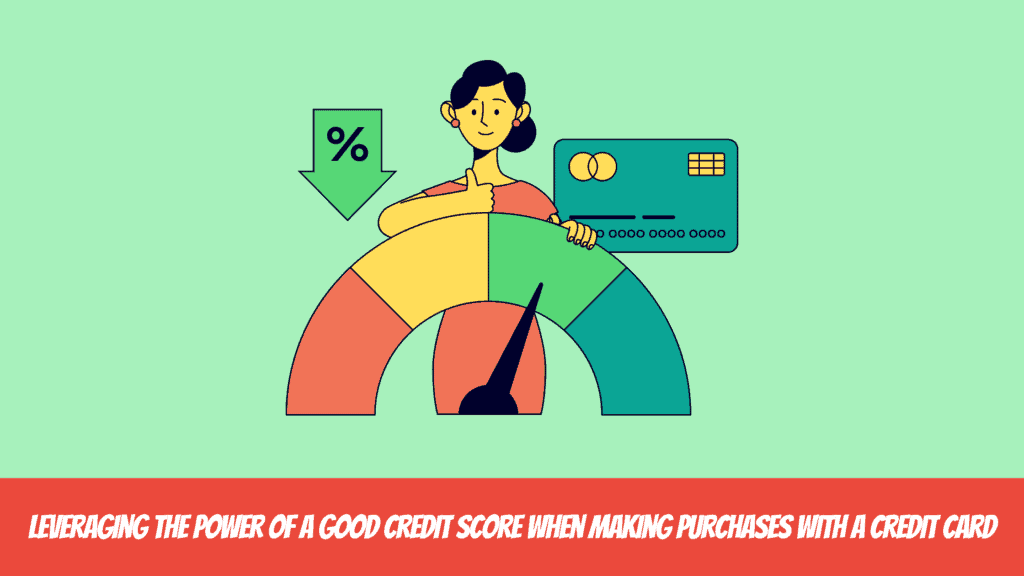
In order to get the most out of your credit cards, it’s essential to maintain a good credit score.
Your credit score is used to determine whether you will be approved for a new card, as well as how much interest you’ll pay if you do qualify.
It also impacts how much of a credit limit you may receive and what type of rewards you can be eligible for.
Maintaining a good credit score requires responsible use of your existing cards.
Paying off balances in full each month, monitoring your spending, and keeping debt levels low are all important steps toward boosting your score.
Setting up automatic payments for recurring bills such as utilities or rent can help avoid late payments that can damage your score.
Having a high credit score will open up more opportunities when applying for new cards.
For example, many premium travel cards require an excellent credit score and may offer additional perks such as higher rewards rates or free companion flights when booking certain tickets.
Even if you don’t need a new card right away, improving your credit score over time will give you the best chance of getting approved when the time comes and save money on interest fees.
Conclusion
The responsible use of a credit card can provide beneficial long-term financial gains. By managing your spending and keeping track of your credit limit, you can avoid spiraling into debt and potentially build a good credit score.
Having a good credit score means that you can more easily obtain loans, mortgages, and other lines of credit.
Achieving these goals is made easier through the use of rewards programs provided by many credit card companies. With careful planning and mindful spending habits, you can leverage these programs to save money on everyday items such as groceries, gas, or clothing.
The rewards earned from this kind of spending could be put towards holiday gifts or special treats for yourself – all without breaking the bank. By taking advantage of promotional offers or discount codes given out by certain retailers or services, you can further stretch your budget while still achieving the same desired result – whatever that may be.
By taking the time to understand how credit cards work, learning how to correctly manage them, and understanding how to properly take advantage of their features and benefits, you can ensure that your financial goals are met without sacrificing too much in terms of convenience or comfort.
Credit cards offer an efficient way to make purchases while at the same time providing a safe and secure form of payment processing with minimal fees or charges being incurred on each transaction. With careful budgeting and mindful use of your card’s features and benefits, you can enjoy greater financial security in the long run and have fewer worries about unmanageable debt accumulation.
Learn More:
- Understanding Credit Cards: What Are They and How Do They Work?
- How to Protect Your Credit Cards from Hackers
- 8 Ways to Protect Yourself from Credit Card Fraud
- How to Choose the Best Credit Card for Your Needs
- 5 Advantages and Disadvantages of Credit Card
- How Credit Card Reward Points Convert to Cash Easily
- 10 Surprising Benefits of Using Credit Cards (You May Not Know About)
